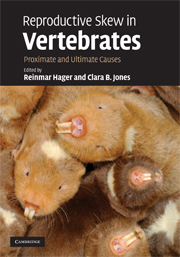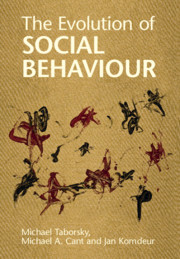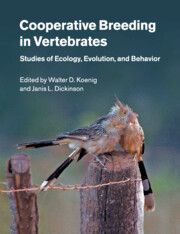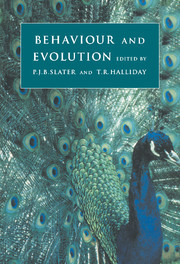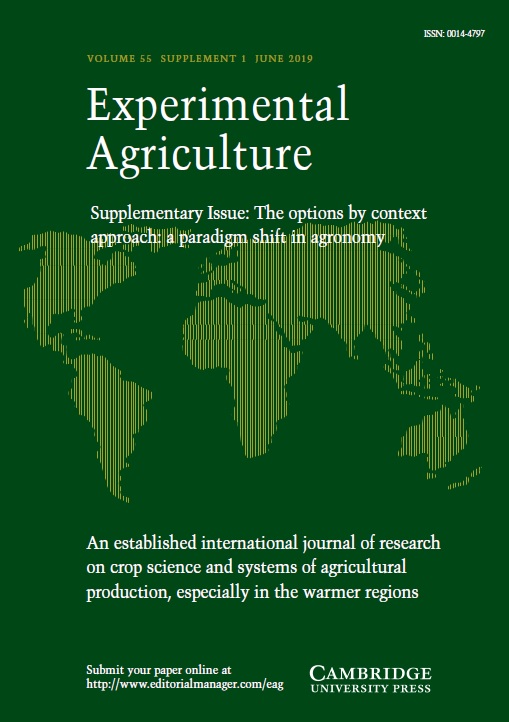Reproductive Skew in Vertebrates
Proximate and Ultimate Causes
£98.99
- Editors:
- Reinmar Hager, University of Manchester
- Clara B. Jones, Fayetteville State University, North Carolina
- Date Published: August 2009
- availability: In stock
- format: Hardback
- isbn: 9780521864091
£
98.99
Hardback
Other available formats:
eBook
Looking for an inspection copy?
This title is not currently available on inspection
-
Reproductive skew is the study of how reproduction is partitioned in animal societies. In many social animals reproduction is shared unequally and leads to a reproductive skew among group members. Skew theory investigates the genetic and ecological factors causal to the partitioning of reproduction in animal groups and may yield fundamental insights into the evolution of animal sociality. This book brings together new theory and empirical work, mostly in vertebrates, to test assumptions and predictions of skew models. It also gives an updated critical review of skew theory. The team of leading contributors cover a wide range of species, from insects to humans, and discuss both ultimate (evolutionary) and proximate (immediate) factors influencing reproductive skew. Academic researchers and graduate students alike with an interest in evolution and sociality will find this material stimulating and exciting.
Read more- Brings together new theory and empirical work testing assumptions and predictions of skew models
- Gives an updated critical review of skew theory
- Covers a wide range of species from insects to humans discussing ultimate (evolutionary) and proximate (immediate) factors influencing reproductive skew
Customer reviews
Not yet reviewed
Be the first to review
Review was not posted due to profanity
×Product details
- Date Published: August 2009
- format: Hardback
- isbn: 9780521864091
- length: 546 pages
- dimensions: 254 x 180 x 29 mm
- weight: 1.22kg
- contains: 13 b/w illus.
- availability: In stock
Table of Contents
1. Models of reproductive skew – outside options and the resolution of reproductive conflict Rufus A. Johnstone and Michael A. Cant
2. Reproductive conflict and the evolution of menopause Michael A.Cant, Rufus A. Johnstone and Andrew F. Russell
3. Reproductive skew in female-dominated mammalian societies Kay E. Holekamp and Anne L. Engh
4. The effects of heterogeneous regimes on reproductive skew in eutherian mammals Clara B. Jones
5.Social skew as a measure of the costs and benefits of group-living in marmots. Thea B. Wang, Peter Nonacs and Daniel T. Blumstein
6. Explaining variation in reproductive skew among male langurs: effects of future mating prospects and ecological factors Reinmar Hager
7. The causes and consequences of reproductive skew in male primates Nobuyuki Kutsukake and Charles L. Nunn
8. Sociality and reproductive skew in horses and zebras Daniel I. Rubenstein and Cassandra M. Nuñez
9. Reproductive skew in avian societies Walter D. Koenig, Sheng-Feng Shen, Alan H. Krakauer and Joseph Haydock
10. Reproductive skew in cooperative fish groups: virtue and limitations of alternative modelling approaches Michael Taborsky
11. Reproductive skew in primitively eusocial wasps: how useful are current models? Jeremy Field and Michael A. Cant
12. Reproductive skew in female common marmosets: contributions of infanticide and subordinate self-restraint David H. Abbott, Leslie Digby and Wendy Saltzman
13. Reproductive skew in African mole-rats: behavioural and physiological mechanisms to maintain high skew Chris G. Faulkes and Nigel C. Bennett
14. The causes of physiological suppression in vertebrate societies: a synthesis Andrew J. Young
15. Understanding variation in reproductive skew: directions for future empirical research Sarah J. Hodge
16. On the evolution of reproductive skew: a genetical view W. Edwin Harris and Reinmar Hager
17. Social conflict resolution, life history, and the reconstruction of skew Bernard J. Crespi.
Sorry, this resource is locked
Please register or sign in to request access. If you are having problems accessing these resources please email [email protected]
Register Sign in» Proceed
You are now leaving the Cambridge University Press website. Your eBook purchase and download will be completed by our partner www.ebooks.com. Please see the permission section of the www.ebooks.com catalogue page for details of the print & copy limits on our eBooks.
Continue ×Are you sure you want to delete your account?
This cannot be undone.
Thank you for your feedback which will help us improve our service.
If you requested a response, we will make sure to get back to you shortly.
×
